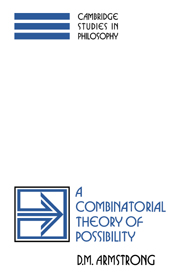Book contents
- Frontmatter
- Contents
- Preface
- PART I NON-NATURALIST THEORIES OF POSSIBILITY
- PART II A COMBINATORIAL AND NATURALIST ACCOUNT OF POSSIBILITY
- 3 Possibility in a simple world
- 4 Expanding and contracting the world
- 5 Relative atoms
- 6 Are there de re incompatibilities and necessities?
- 7 Higher-order entities, negation and causation
- 8 Supervenience
- 9 Mathematics
- 10 Final questions: logic
- Works cited
- Appendix: Tractarian Nominalism, by Brian Skyrms
- Index
- Frontmatter
- Contents
- Preface
- PART I NON-NATURALIST THEORIES OF POSSIBILITY
- PART II A COMBINATORIAL AND NATURALIST ACCOUNT OF POSSIBILITY
- 3 Possibility in a simple world
- 4 Expanding and contracting the world
- 5 Relative atoms
- 6 Are there de re incompatibilities and necessities?
- 7 Higher-order entities, negation and causation
- 8 Supervenience
- 9 Mathematics
- 10 Final questions: logic
- Works cited
- Appendix: Tractarian Nominalism, by Brian Skyrms
- Index
Summary
WHAT IF THERE ARE NO ATOMS?
The Combinatorial scheme as so far developed postulates simples: simple individuals, simple properties and simple relations, all conceived of as abstractions from atomic states of affairs. But is the world made up of simples in this way?
May it not be that some, or all, individuals have proper parts which in turn have proper parts, ad infmitum? It is not certain that, just by itself, this supposition contradicts the idea that the individuals concerned are not made up of simples. For one might hold that such individuals are made up of an infinite number of simple individuals. For instance, there are those who hold that any extension is infinitely divisible into extensions, and yet that extensions are made up of continuum-many simple points. However, we can sophisticate our question to allow for this complication. Might it not be that some, or all, individuals have proper parts which in turn have proper parts, ad infmitum, without there being simple constituents even at infinity?
Similar questions can be raised about properties and relations.
It might be, for instance, that the property F is nothing but the conjunction of two wholly distinct properties G and H, that G and H, in their turn, are conjunctions of properties, and so ad infmitum. This progression, it may be, does not even end ‘at infinity’. There are no simple properties involved, even at the end of an infinite road.
Information
- Type
- Chapter
- Information
- A Combinatorial Theory of Possibility , pp. 66 - 76Publisher: Cambridge University PressPrint publication year: 1989
